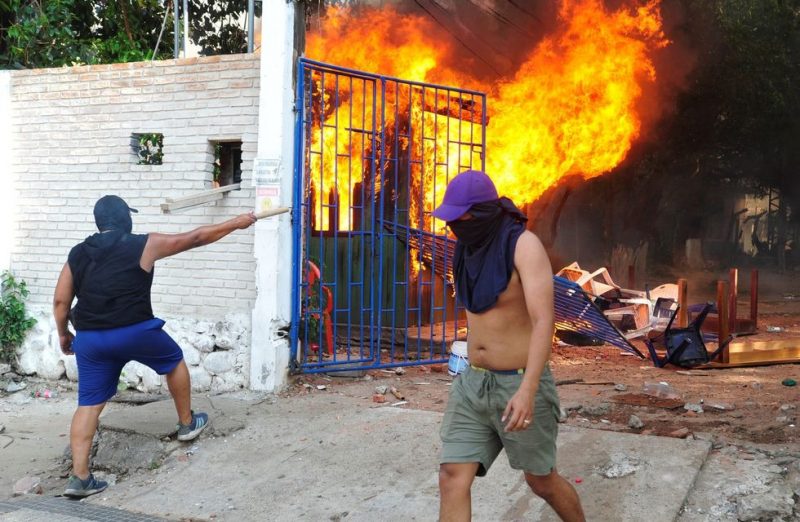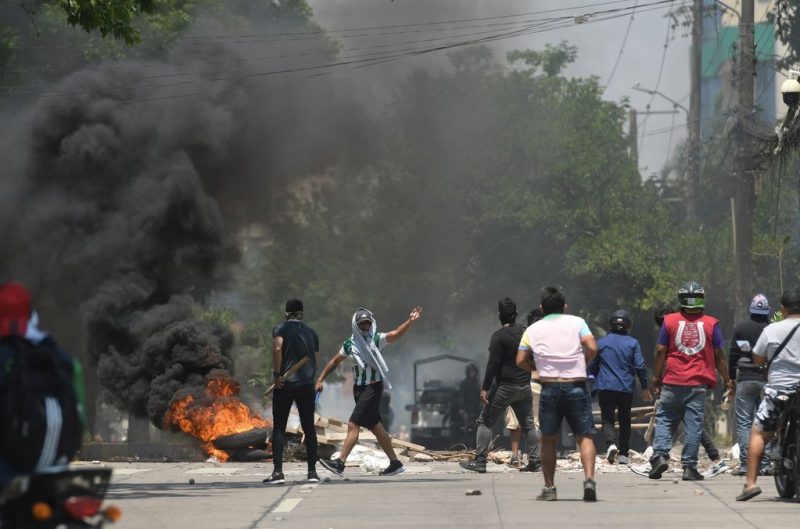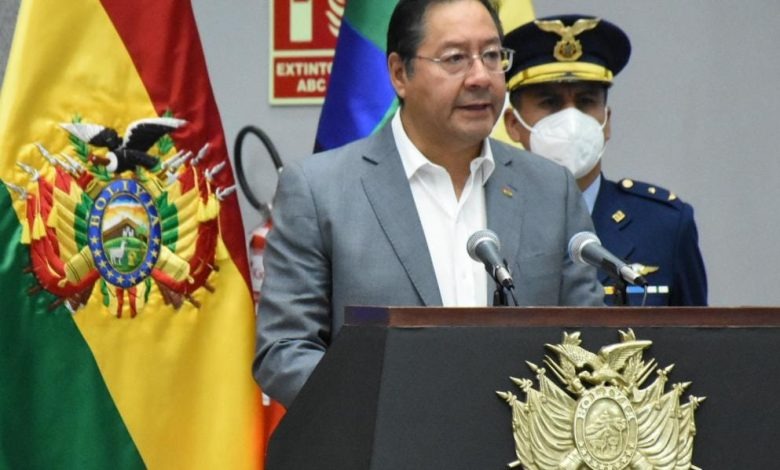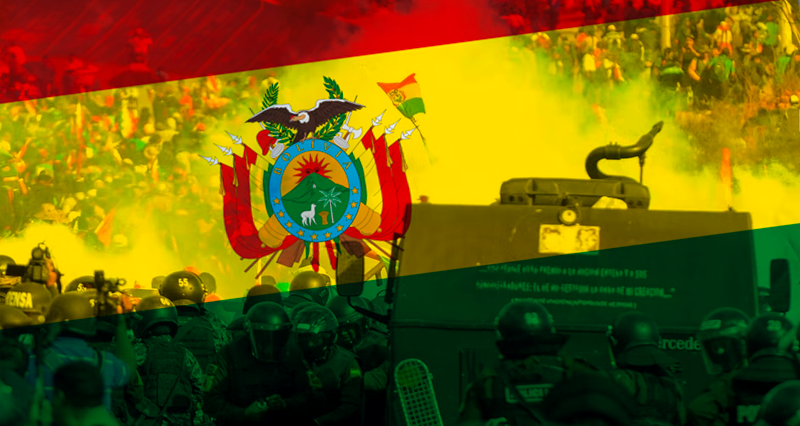By Oscar Rotundo *
In Bolivia, the fascist partyocracy intends to wear down the government and promote a coup insurrection like in 2018, which led to the 2019 coup. The arrogance with which they usually operated and the contempt for the people, never permitted them to imagine that the people would return to government, dismantling the coup in the streets and electorally installing, and by a considerable majority, a popular government that would continue with the process of change.
Popular government had to bear the weight of the pandemic and the economic collapse left by the multi-party corruption of those who made up that band of looters. Some of these looters are in prison, others on the run – for the moment – and others went unpunished, such as the coup leader Luis Fernando Camacho.
As soon as the government of Luis Arce began to indicate the path for recovery, the criminal horde disguised as political parties, in many cases inserted in the democratic institutions beaten hundreds of times by themselves, began to undermine the steps towards economic stabilization and social recomposition.
For this date in the year 2021, the Government had to reverse course with a fundamental law for the political, social and economic reorganization. A step back was taken from the Law 1386, a fundamental tool for the “National Strategy to Fight against the Legitimation of Illicit Gains and the Financing of Terrorism”, since the opposition generated a disinformation campaign through the media and social networks, organizing stoppages and blockades in some regions of the country, dividing society with its manipulations and empowering the worn-out promoters of coup against Evo Morales, Carlos Mesa, Samuel Doria Medina, Luis Camacho and Rómulo Calvo as leaders of social demands.
This is how the government began the year 2022 with the framework of another coup, willing to impede the process of change and accumulate forces to attack the people again. The objective was clear: to force the resignation of Luís Arce and call for early elections.

They need chaos and for this they incite institutional, social or regional conflicts. They want to demonstrate that the government cannot lead the country’s destinies, materialize its campaign promises and advance the strategic interests of both foreign multinationals and sectors of the Bolivian economy.
In 2022, the National Population and Housing Census was to be carried out, precisely on November 16 of this year, but in light of technical and budgetary observations, the government decided through Supreme Decree 4760, issued in July, to postpone its completion. The new latest date was set on the first semester of 2024, so that it is carried out “with the highest standards”.
Given this fact, the Census became the new flag for destabilization at the hands of the right, embodied in the figure of the coup-mongering governor of Santa Cruz, Luis Fernando Camacho. He was joined by former president Carlos Mesa, businessman Samuel Doria Medina, and the president of the Inter-institutional Committee, Vicente Cuellar, alongside the Santa Cruz leader Rómulo Calvo.
How does the opposition’s desperation for the urgent completion of the Census fit in with their destabilizing and dismissal plans?
According to paragraph V of article 146 of the Political Constitution of the Plurinational State: “The distribution of the total seats among the departments will be determined by the Electoral Body based on the number of inhabitants of each one of them, according to the last National Census made in accordance with the Law. For equity reasons, the law will assign a minimum number of seats to the departments with the smallest population and the least degree of economic development. If the distribution of seats for any department is uneven, preference will be given to the allocation of single-member seats.”
Santa Cruz reached a significant demographic growth of 800,000 inhabitants since the 2012 Census. Its population is young, about 60% is younger than 30 years.
Santa Cruz also contributes 30% to Bolivia’s GDP, 12,355 million dollars in 2021, when it grew 5.7%. That means, if the Census were carried out in this scenario, this governorate would have the possibility of obtaining a greater amount of seats.

Another element to take into account and that is of the utmost importance, is that the Framework Law of Autonomies establishes in its third transitory provision that the tax co-participation resources will be “distributed according to the number of inhabitants of the jurisdiction of the autonomous territorial entity, based on data from the latest National Population and Housing Census”.
These are transfers from the State administration, equivalent to twenty percent (20%) in the case of autonomous territorial entities (governors and municipalities) and 5 percent (5%) to public universities. These resources come from the collection in cash of the Value Added Tax, the Complementary Regime to the Value Added Tax, the Tax on the Profits of Companies, the Transactions Tax, the Tax on Specific Consumption, the Customs Tax, the Tax on the Free Transmission of Goods and the Tax on Exits Abroad.
It is no coincidence that Camacho, in an interview conducted a few days ago with a local media, once again insisted on federalism as the only solution to the “fissure that comes from the founding of the Republic.”
In the last elections of the 36 seats for Senators, the MAS-IPSP obtained 21- Citizen Community CC (Mesa)- 11 and Creemos (Camacho) 4. In the Chamber of Deputies, of the 130 seats the MAS-IPSP obtained 75, Citizen Community CC (Mesa) 39 and Creemos (Camacho) 16.
Given all this, given the resistance of these sectors to abide by the proposed date, the government called for the installation, in the city of Trinidad, Beni, of a Technical Commission to establish the final date of the Population and Housing Census in the country, with the presence of more than 50 specialists, whose results would be binding and in which 41 representatives from all over the country would participate.
Of this Technical Commission, designed by the Plurinational Meeting for a Census with Consensus, which was inaugurated and installed by President Luis Arce, 5 representatives withdrew and 36 remained, that is, more than 80%, who, at the end of their work, they decided that the Census would be carried out in March 2024, 8 weeks apart from the completion proposed by the opposition for the year 2023.
But to make the background of the refusal of the coup opposition clearer, it is important to take into account the statements made by the head of the Santa Cruz Civic Committee, Rómulo Calvo, who declared to the American chain CNN that after the demand for the “Census in 2023 yes or yes ”, will go to the demand for the resignation of the president Arce.
On Sunday the 13th, a town hall was held in Santa Cruz in which it was demanded that the census be in 2023 and the government was given 72 hours to release the detainees and that the date of the census be set in a law, among other determinations.

Comunidad Ciudadana (CC), a force led by Carlos Mesa, indicated this Monday that it will present a bill to the Legislative Assembly that proposes that the census take place in October 2023 in order to have the final results in the first semester of 2024, despite the fact that the Government has already determined the date for March 2024.
As we can see, this unilateral act proposed by the Santa Cruz opposition, which is unaware of the actions of the members of the Technical Committee and the government, beyond any excuse, has no other objective than to destabilize the government and shorten the presidential term of Lucho Arce.
If it materializes, what is expected is that Vice President David Choquehuanca assumes the leadership of the Plurinational State with the sole task, by mandate of the Political Constitution of the State, of calling elections within a period of ninety days.
November 15 marked the third anniversary of the Senkata and Sacaba massacres, and with fresh memories of the criminal balance of that 2019-2020 coup, the Bolivian people have to endure this new coup adventure that has already generated four dead, 178 injured, group rape at checkpoints and 720 million dollars in losses, among other fascist atrocities that increase every day, turning Santa Cruz into a paramilitary state.
Luis Arce was elected president of Bolivia in the first round, by the Movement for Socialism (MAS-IPSP), with 55.11% of the votes.
The Movimiento al Socialismo obtained 54.73% of the votes in the multi-member chamber of senators and deputies and 53.72% of the votes for single-member deputies.
It is essential that before the popular unease continues to deepen in the face of this notorious escalation of the coup, the government and the MAS-IPSP, together with the workers’ unions and social movements, enforce the popular will and democracy.
The triumph of fascist arrogance is inadmissible and intolerable. As stated by the Liberator Simón Bolívar: “To hesitate is to perish.”
* editor at PIA global
















Leave a Reply